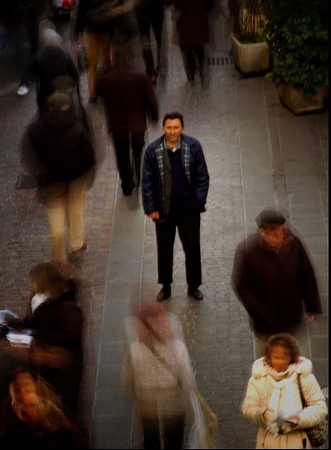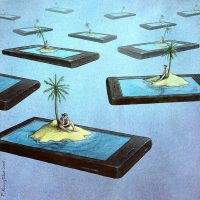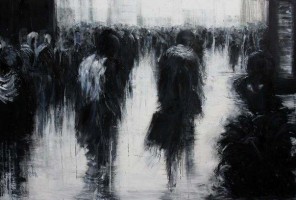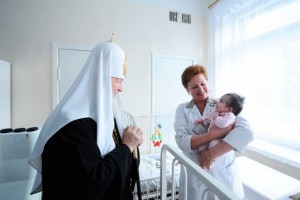In an age when families no longer eat dinner together, children watch TV, play computer games, and text message their friends from their bedrooms; when adults can be seen walking in our cities talking on cell phones; at a time in history when people can be sitting in a cafe with friends, all the while talking to someone else on a mobile phone, we have become a people living together in isolation.
I remember from my youth visiting my elderly grandmother, always finding her radio and TV blasting away. You’d walk into her kitchen and hear a radio, while in the living room you’d find her TV on, even though she rarely was listening to either. I knew this was a sign that she was lonely and the noise kept her company. Yet, when she did have someone there to visit, all the other sounds would be shut off.
On many occasions I’ve had to ask people if they wouldn’t turn their TVs off when I’d arrive for a pastoral call. People don’t often notice the distractions that they’ve allow to intrude into their homes, having become so accustomed to these foreign invaders. Many husbands are shocked when their wives file for divorce; having been so consumed with outside entertainment, they failed to notice the line of communication between themselves and their spouses had been lost years earlier.
Children are no longer supervised with their homework because their parents are uninvolved, partly because the technology has left them in the dark. They therefore trust their children are working on their homework. The truth is often the case that their children are watching music videos on YouTube, while text messaging their friends. (I once taught both in a high school and a college, so I know this to be true.)
Even in our spiritual lives we tend to be living in isolation. Many reserve their prayers to issues revolving around their finances, or prayers offered regarding their health or that of a family member. Yet these people rarely think of the importance of corporate prayer with family and friends apart from the Sunday Liturgy. Prayer is a private matter, rarely shared with others. The fact that public prayer outside one’s parish is now frowned upon by the government has further eroded our sense of corporate prayer as being something we, as a nation, value.
Entertainment has also taken on a central role in our lives, becoming so important as to have replaced visiting neighbors or friends. I’m old enough to remember the day when neighborhoods were filled with homes sporting large front porches. On those hot summer nights, families would be sitting on their porches, sipping lemonade and waving at passing neighbors who were actually out for a stroll. Now we have air conditioners, and front porches have been replaced with private back patios where no one can see us. Gone are the days of neighborliness. Isolation rules.
The Church is the Body of Christ, and by her very nature is anything but an institution wherein one can be isolated from others. We only let it be so if we fail to involve ourselves as the people of God with one another. The greeting given by Orthodox Christians, passing on the holy kiss when we meet one another or kissing the hand of our priest, are ways we avoid the isolation that dominates the society in which we live. Staying for the coffee hour or the agape meal following the Sunday Liturgy are ways in which we can do battle against the isolation that dominates the rest of our world. Attending mid-week services is another way to stave off isolation.
Our youth need to learn from us the importance of communicating directly with their friends and family. Taking children out for a Sunday afternoon drive, exploring the countryside, radio off, is a wonderful way for families to reconnect. Taking grandmother on a family picnic to a local park, avoiding the back yard, is a wonderful, old-fashioned way of introducing community to children. Letting them play with cousins in a park as the extended family gathers for a picnic can build families bonds that can last a lifetime.
When was the last time you sat around with a senior member of your family and asked them to share the memories of their youth? What a wonderful way to reconnect an aging grandfather to his youth and show him that you value his life experiences and the memories of his own parents and grandparents? What an invaluable legacy you impart to your children, letting them know they were not born in a vacuum but are a part of a long line of real people.
Isolation is a terrible threat to our way of life. Young people no longer have the communication skills that past generations learned from older family members. I am astounded when I think of how much of my grandparents are a real part of who I’ve become. It is not just genetics that they passed on to me, but memories of family history that was long gone when I was born. Even parts of my personality were gleaned from my great-grandfather. My study, filled as it is with photographs, icons, and collectibles, is a style that became my own, having loved the same clutter and warmth of my grandparents’ home.
Isolation does not have to be a part of our world. It just takes commitment on our part to build family and community. When people visit the monastery, I routinely ask that they turn off their cell phones so we can all leave isolation behind and connect as family, the children of the Most High. What a wonderful thing it would be if each family had two hours each night when the house phone, cell phones, the TV, and all other outside intrusions were banned. How about an evening of playing Uno as a family or putting a puzzle together? Then ending the evening with the whole family standing before the icon corner doing the evening prayers!




















